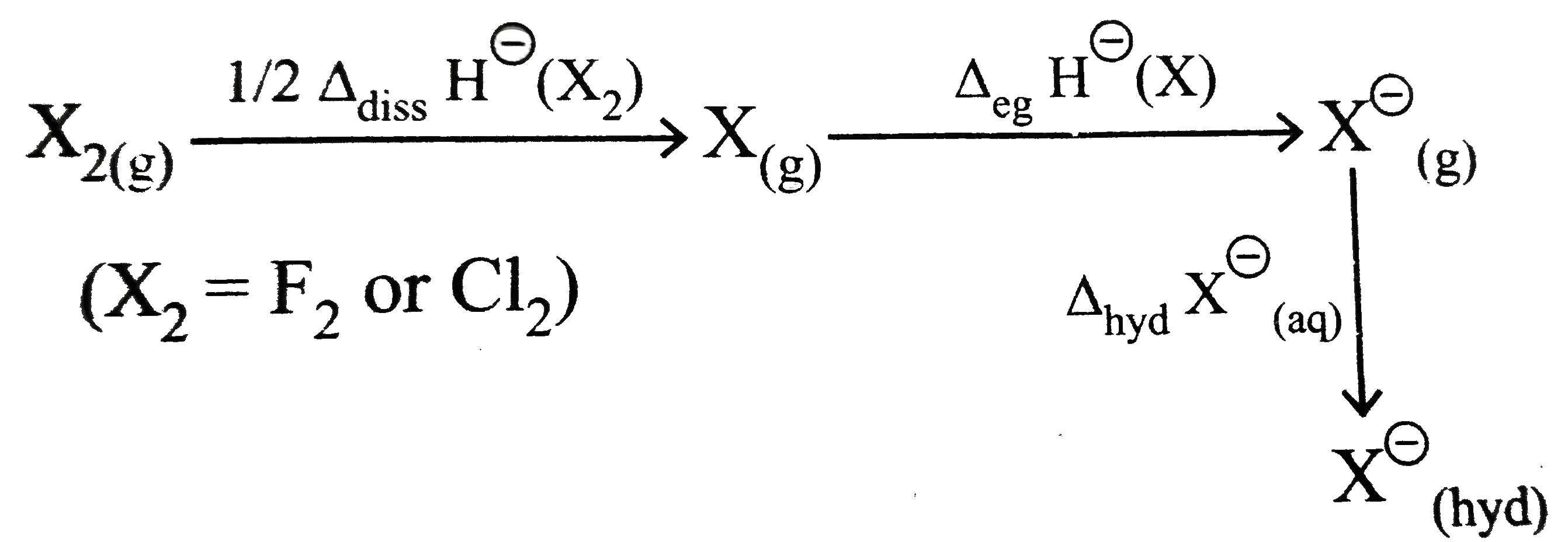Considering the parameters such as bond dissociation enthalphy, electron gain enthalpy and hydration entalpy, compare the oxidising power of and .

Elctrode potenential depends on:
Although, electron gain enthalpy of fluorine is less negative than that of chlorine the bond dissociation enthalpy of bond is much lower than bond and hydration enthalpy of ion is much higher than that of ion. The later two factors more than compensate the less negative electron gain enthalpy of . Consequently electrode potential of is higher than and is a much stronger oxidising agent than .
Topper's Solved these Questions
- APPENDIX INORGANIC VOLUME 2BOOK - CENGAGE CHEMISTRYCHAPTER - APPENDIX INORGANIC VOLUME 2EXERCISE - Exercises
126 Videos
- APPENDIX INORGANIC VOLUME 2BOOK - CENGAGE CHEMISTRYCHAPTER - APPENDIX INORGANIC VOLUME 2EXERCISE - Short Answer Type
179 Videos
- AMINESBOOK - CENGAGE CHEMISTRYCHAPTER - AMINESEXERCISE - QUESTION BANK
1 Videos
- AROMATIC COMPOUNDS AND ALKYL AND ARYL HALIDES BOOK - CENGAGE CHEMISTRYCHAPTER - AROMATIC COMPOUNDS AND ALKYL AND ARYL HALIDES EXERCISE - Archives Subjective
18 Videos
Similar Questions
Considering the parameters such as bond dissociation enthalpy, electron gain enthalpy and hydration enthalpy, compare the oxidising power of F2andCl2.
View SolutionConsidering the parameters such as bond dissociation enthalpy, electron gain enthalpy and hydration enthalpy, compare the oxidising power of F2andCl2
View SolutionConsidering the parameters such as bond dissociation enthalpy, electron gain enthalpy and hydration enthalpy, compare the oxidising power of F2andCl2
View SolutionConsidering the parameters such as bond dissociation enthalpy, electron gain enthalpy and hydration enthalpy, compare the oxidizing power of F2 and Cl2.
View SolutionConsidering the parameters such as bond dissociation enthalpy, electron gain enthalpy and hydration enthalpy, compare the oxidising power of F2andCl2
View Solution(i) Considering the parameters such as bond dissociation enthalpy , electron gain enthalpy and hydration enthalpy, compare the oxidizing power of F2 and Cl2.
(ii) Complete the following reactiosn:
(a) Cu+HNO3(dilute)→
(b) Fe3++SO2+H2O→
(c) XeF4+O2F2→
View SolutionCompare the oxidizing powers of F2andCl2 on the basis of bond dissociation enthalpy, electron gain enthalpy of halogens and hydration enthalpy of halide ions.
View SolutionF2 has lower bond dissociation enthalpy than Cl2. Why?
View SolutionF2 has lower bond dissociation enthalpy than Cl2. Why?
View SolutionBond dissociation enthalpy of F-F bond is less than that of Cl-Cl bond. Explain.
View Solution
